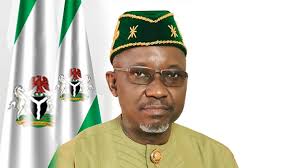
Nigeria will transform into a gas-powered economy by 2030 — Minister
By Olaseinde Gbenga, Abuja and Esther Agbo
The Minister of State Petroleum Resources (Gas), Hon. Ekperikpe Ekpo as revealed that the Ministry has declared the Decade of Gas Initiative, aimed towards transforming Nigeria into a gas-powered economy by 2024
He made the disclosure at the ongoing Annual Nigeria Oil and Gas Conference on Tuesday in Abuja, under the theme, “Showcasing Opportunities, Driving Investment and Meeting Energy Demand.”
According to him, “The Ministry of Petroleum Resources – Gas is at the forefront of steering Nigeria towards a prosperous and sustainable energy future. Our mandate involves not only formulating policies and supervising their implementation in the oil and gas industry but also creating an enabling environment that fosters growth, innovation, and investment.”
Ekpo further outlined how the ministry has been fulfilling its role through focus on showcasing opportunities, driving investments, and meeting energy demand.
He stressed that the Ministry is committed to highlighting the vast opportunities within Nigeria’s gas sector, through strategic initiatives and comprehensive policies.
“We aim to reveal the untapped potential across the entire value chain. Our natural gas reserves of 209 trillion cubic feet (tcf) are among the largest globally, offering immense possibilities for exploration, production, and utilisation.
According to him, “We are particularly focused on promoting gas-based industries such as fertilisers, petrochemicals, and methanol. These industries not only diversify our economy but also create significant employment opportunities. By showcasing these prospects at forums like this conference, we aim to attract global attention and encourage partnerships that can drive growth and development.”
He further submitted that Investment is the lifeblood of the oil and gas sector. The Ministry has been instrumental in implementing reforms that make Nigeria an attractive destination for both local and international investors.
“The Petroleum Industry Act (PIA) 2021 and the recent Presidential Directive for Oil and Gas Companies on Tax Incentives, Exemption, Remission, by His Excellency, President Bola Ahmed Tinubu, GCFR have created a conducive environment for investment.These reforms ensure transparency, accountability, and regulatory certainty, making Nigeria an attractive destination for investors.”
He then stated that the regulatory frameworks now in place incentivize investment, streamline bureaucratic processes, and provide clarity on fiscal terms.
“A key initiative under our investment strategy is the Midstream and Downstream Gas Infrastructure Fund (MDGIF). The MDGIF is designed to catalyse investments in critical infrastructure projects in the midstream and downstream value chain.”
He said, “By addressing infrastructure gaps, we can significantly enhance the efficiency and reliability of our gas supply chain.
“Meeting the growing energy demands of our nation and the continent is a priority for the Ministry. We recognise that natural gas is central to achieving this goal, given its status as a cleaner and more efficient fuel.”
“Our gas-to-power initiatives are pivotal, aiming to provide reliable and affordable electricity that supports industrialization and improves living standards,” he said.
The Minister added that the Ministry is promoting the use of Compressed Natural Gas (CNG) for vehicles, also known as Autogas.
According to him, “This initiative is not only a strategic response to cushion the effects of downstream deregulation but also a significant driver of market growth and job creation for Nigerians.”
He said, “The transition to Autogas presents numerous benefits, including efficiency, availability, accessibility, versatility, and environmental safety.”.
He emphasised that by fostering the use of CNG and Liquefied Petroleum Gas (LPG), “we are positioning Nigeria as a leader in clean energy solutions, enhancing both energy security and environmental sustainability.”
The Ministry is also committed to expanding domestic gas utilisation by fostering strategic partnerships and supporting innovative projects.
“We aim to enhance energy access and drive sustainable development. Our vision is to ensure that every Nigerian has access to affordable and reliable energy, thereby fostering economic growth and improving quality of life.
“In alignment with these goals, the Ministry has declared the Decade of Gas Initiative. This ambitious initiative aims to transform Nigeria into a gas-powered economy by 2030. It involves optimising the entire gas value chain, from exploration and production to processing and utilisation.”
He said that the Decade of Gas is not just a policy declaration but a strategic vision to harness our gas resources for national development.




